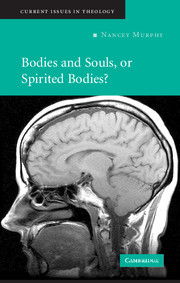Crossref Citations
This Book has been
cited by the following publications. This list is generated based on data provided by Crossref.
Lombaard, Christo
2007.
Thinking through the spirited web. Some clarifications on the Internet and embodied experiences thereof.
Communicatio,
Vol. 33,
Issue. 2,
p.
1.
2007.
Table of Contents.
ASHE Higher Education Report,
Vol. 33,
Issue. 2,
p.
1.
Newsom, Robert W.
2008.
Comments on ‘Spirituality and nursing: a reductionist approach’ by John Paley.
Nursing Philosophy,
Vol. 9,
Issue. 3,
p.
214.
Farah, Martha J.
and
Murphy, Nancey
2009.
Neuroscience and the Soul.
Science,
Vol. 323,
Issue. 5918,
p.
1168.
Brownell, Philip,
2009.
Executive Functions: A Neuropsychological Understanding of Self-Regulation.
Gestalt Review,
Vol. 13,
Issue. 1,
p.
62.
Hoffman, Lowell W.
and
Strawn, Brad D.
2009.
Normative Thoughts, Normative Feelings, Normative Actions: A Protestant, Relational Psychoanalytic Reply to E. Christian Brugger and the Faculty of IPS.
Journal of Psychology and Theology,
Vol. 37,
Issue. 2,
p.
125.
Brownell, Philip,
2009.
Executive Functions: A Neuropsychological Understanding of Self-Regulation.
Gestalt Review,
Vol. 13,
Issue. 1,
p.
62.
Buckareff, Andrei A.
and
Van Wagenen, Joel S.
2010.
Surviving resurrection.
International Journal for Philosophy of Religion,
Vol. 67,
Issue. 3,
p.
123.
Murphy, Nancey
2010.
Science and Religion in Dialogue.
p.
740.
HOGUE, DAVID
2010.
BRAIN MATTERS : NEUROSCIENCE, EMPATHY, AND PASTORAL THEOLOGY.
Journal of Pastoral Theology,
Vol. 20,
Issue. 2,
p.
25.
Patterson, Gary
2010.
Science and Religion in Dialogue.
p.
359.
Crawford, Robert
2011.
The Battle for the Soul.
p.
1.
Crawford, Robert
2011.
The Battle for the Soul.
p.
45.
Murphy, Nancey
2011.
Astronomy and Civilization in the New Enlightenment.
p.
175.
Blevins, Dean G.
2011.
Brain Matters: A Journey With Neuroscience and Religious Education.
Religious Education,
Vol. 106,
Issue. 3,
p.
246.
McFarland, Ian A.
Fergusson, David A. S.
Kilby, Karen
and
Torrance, Iain R.
2011.
The Cambridge Dictionary of Christian Theology.
p.
452.
Garzon, Fernando L.
and
Hall, M. Elizabeth Lewis
2012.
Teaching Christian Integration in Psychology and Counseling: Current Status and Future Directions.
Journal of Psychology and Theology,
Vol. 40,
Issue. 2,
p.
155.
Miller, James B.
2012.
Haunted by the Ghost in the Machine. Commentary on “The Spirituality of Human Consciousness: A Catholic Evaluation of Some Current Neuro-scientific Interpretations”.
Science and Engineering Ethics,
Vol. 18,
Issue. 3,
p.
503.
2012.
The Physical Nature of Christian Life.
p.
13.
DuMont, Andy
2012.
Luminous Deceptions: Contingent Community and Aesthetic Form in Cormac McCarthy's "The Road".
The Cormac McCarthy Journal,
Vol. 10,
Issue. 1,
p.
56.



